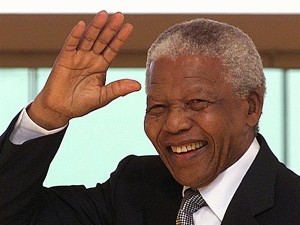By Rose O. Sherman, EdD, RN, FAAN
“To be courageous is an opportunity that sooner or later is presented to all of us.” John F. Kennedy
 Last week, the world lost a truly great leader with the death of Nelson Mandela. He died last week at 95 of a lung infection connected to the tuberculosis he contracted while serving 27 years as a political prisoner. What people admired most about Mandela were the choices that he made in his leadership. Despite his long imprisonment, he believed that “if you want to make peace with your enemy you have to work with your enemy. Then he becomes your partner.” Following his jail term, with the violent, racist apartheid system crumbling under world pressure, he embraced President F.W. de Klerk and then served alongside him in a transitional coalition of national unity. The two men won the Nobel Peace Prize in 1993. Mandela throughout his life demonstrated these Leadership Moments where his choices dramatically impacted the fate and fortunes of those he served. Mandela has been a powerful inspiration to millions of people around the world for the strength of character he showed in the face of one of the world’s most brutal regimes and his enduring power to accept and forgive his former oppressors.
Last week, the world lost a truly great leader with the death of Nelson Mandela. He died last week at 95 of a lung infection connected to the tuberculosis he contracted while serving 27 years as a political prisoner. What people admired most about Mandela were the choices that he made in his leadership. Despite his long imprisonment, he believed that “if you want to make peace with your enemy you have to work with your enemy. Then he becomes your partner.” Following his jail term, with the violent, racist apartheid system crumbling under world pressure, he embraced President F.W. de Klerk and then served alongside him in a transitional coalition of national unity. The two men won the Nobel Peace Prize in 1993. Mandela throughout his life demonstrated these Leadership Moments where his choices dramatically impacted the fate and fortunes of those he served. Mandela has been a powerful inspiration to millions of people around the world for the strength of character he showed in the face of one of the world’s most brutal regimes and his enduring power to accept and forgive his former oppressors.
Most of us will never be faced with the leadership challenges faced by Nelson Mandela. But within the context of our leadership roles, we will all have what Michael Useem (a professor at the Wharton School of Management), describes as leadership moments.
What is a Leadership Moment?
Useem describes a leadership moment as the decisions that leaders make when the stakes are high and the outcomes depend largely on us. It is when your actions as a leader will shape the future of others. Useem believes that all leaders need to be prepared for these moments by staying in touch with their core values and what matters most. Although his book was written in 1998, the principles are even more important today with the uncertainty that leaders face in these turbulent times of healthcare reform.
How do you prepare for Leadership Moments?
Useem believes that one way to prepare for leadership moments is to study the actions of other leaders in difficult situations. This might involve seeking out a mentor who has faced a challenging situation to talk about his/her experience. You might also want to consider reading the autobiographies and biographies of great leaders. This is something that I have always done in my life. Right now, I am reading Doris Kearns Goodwin’s new book Bully Pulpit which is about the leadership of President’s Theodore Roosevelt and William Howard Taft during an era where there was great income inequity in this country. You are reminded when reading history how little about human nature really changes but how critical leadership decisions can make a huge impact on the direction of public policy.
Useem suggests that a single lesson that emerges when you evaluate the lessons learned from leadership moments is the overwhelming significance of vision and action. Having the vision of knowing where you want to go and being able to explain that to others is an important step in reaching any destination. One must also be willing to act and in some circumstance that action needs to be done quickly. To do this, you need to know yourself and be willing to fail. When Mandela became president of South Africa, there were many who wanted him to punish his oppressors, the apartheid-era commanders and enforces. Instead, he did a remarkable. In 1995, he set up a Truth and Reconciliation Commission where victims could tell their stories and perpetrators told theirs. The commission granted former government officials and employees amnesty in exchange for their honesty about what they did. With this, he changed the course of history.
Read to Lead
Useem, M. (1998). The Leadership Moment. New York: Random House.
© emergingrnleader.com 2013


 LinkedIn
LinkedIn Instagram
Instagram